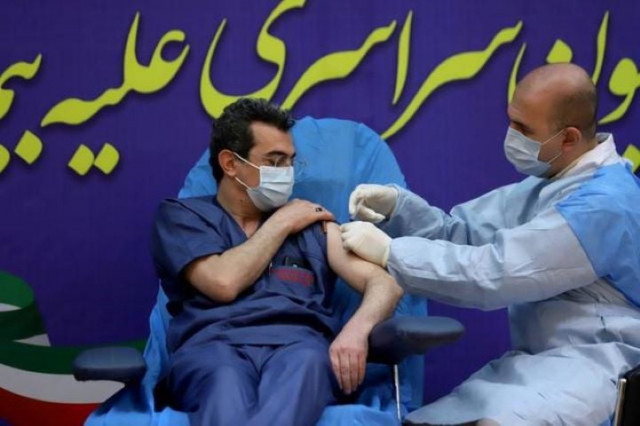Clean chit: Viral rumours about the vaccine dispelled
Govt’s stop health adviser says Sinopharm vaccine is safe and effective

The government’s top health adviser on Tuesday put rumors about the coronavirus vaccine’s safety to bed by saying ‘it is safe and effective.’
Shortly after the country received its first doses of the Covid-19 vaccine from China, news articles about the safety of the vaccine started doing rounds. Some reports even suggested Dr. Faisal Sultan, Special Assistant to the Prime Minister (SAPM) on Health, had said that the Sinopharm vaccine was unsafe for pregnant women and people over the age of 60.
“The question wasn’t that it was safe or unsafe. There wasn’t enough data to make a valid recommendation and that was the reason behind the decision to administer the vaccine to patients between the age of 18-60,” explained Dr. Sultan.
Talking exclusively with the Express Tribune, the prime minister’s special assistant answered a wide range of questions related to the growing arsenal of vaccines against Covid-19, their efficacy and safety.
“There is no evidence that suggests it was unsafe for people above 60,” claimed Dr. Sultan. “It was simply due to the lack of evidence to provide a statistically valid conclusion,” explained Dr. Sultan from Islamabad.
Earlier this month, Pakistan became the first foreign recipient of half a million doses of the Sinopharm vaccine, manufactured by a Chinese state-owned company. The Beijing-based producer has developed one of two major Chinese vaccines that were rolled out globally. The Sinopharm vaccine was the first to receive Pakistan’s top health advisory body’s nod along with AstraZeneca and others.
Referring to published scientific data, Dr. Sultan said the Sinopharm vaccine’s efficacy range is between 79 – 85%, which has brought China to the front row of global vaccine makers.
The choice of vaccine, he explained, is made on the basis of availability, timing and volume. “Pfizer, Moderna, Sputnik, Sinopharm, and CanSino are all reasonable choices to make depending on the country’s situation. The decision is not just based on the availability but the timely availability of the vaccine,” said Dr. Sultan, who has also served as the chief executive officer of Shaukat Khanum Memorial Cancer Hospital & Research Centre.
“At this stage we are using Sinopharm then it is AstraZeneca through the Covax facility. Wherever we see a gap we will fill it with other options like Sputnik which has 90% efficacy,” said Dr. Sultan referring to Pakistan’s priority list for vaccines.
Vaccination
In order for a vaccine to receive the blessings of the world’s leading drug regulators, it needs to afford at least a 50% protection rate to be considered effective. While Sinopharm hasn’t received that nod from the World Health Organization (WHO), the global health regulator’s Director-General, Tedros Adhanom has said teams are working with producers of the Sinovac and Sinopharm vaccines to assess compliance with international quality manufacturing practices.
In its effort to inoculate the population, Pakistan plans to source doses from all over the world including the WHO’s Covid-19 Vaccines Global Access Facility (Covax) program, an ambitious scheme that is working towards the development, purchase and delivery of vaccines to more than 180 countries.
The federal government has also promised to provide Covid-19 vaccines free of charge to citizens when it is widely available. This month’s Sinopharm shipment is the first vaccine to arrive in Pakistan, where more than 546,000 cases of the Covid-19 virus have been recorded since the start of the pandemic twelve months ago.
“I’m the one who made that statement. To gain society’s immunity, you need approximately 2/3rd of the population to be vaccinated. So, if you vaccinate 100 million people (above 18) you’ve reached that mark. That is a theoretical number that one aspires to,” explained Dr. Sultan.
Factors such as our societal structure, vaccine acceptance, vaccine hesitancy, Dr. Sultan said will have an impact on the final number individuals who receive the vaccine.
While the government has a plan to deploy vaccines through its existing infrastructure across the country, healthcare professionals have expressed concerns about the unregulated import by private hospitals. And some reports suggest that private hospitals are charging exuberant amounts for a single dose.
In this matter, healthcare experts believe that the government would need to create regulations that will limit the import of vaccines to reputable hospitals. This limited access, health experts suggested, should only be given to private hospitals that have established Covid-19 treatment facilities. However, these authorized private hospitals should be allowed to bill patients for the dedicated services required to administer the vaccine.
Challenges
As the pressure to vaccinate populations mounts, most countries, including those in the developed world are struggling to figure out how to get jabs into more arms. In Pakistan, Dr. Sultan said that was relatively easy due to the presence of the existing Expanded Programme on Immunization (EPI), which has been used for decades to protect children by immunizing them against childhood tuberculosis, poliomyelitis, diphtheria, pertussis, tetanus and measles.
“Our first challenge was the procurement of the vaccine. Now that we have the vaccine, the next step was to ensure that we have a physical system (supply chain) to deliver it. That was relatively easy because the EPI system was already there.”
Dr Sultan listed tracking recipients of the vaccine as another challenge. “Who receives it, when and how many doses? That was addressed by the National Immunization Management System (NIMS).”
Like much of the world, hesitancy to get the vaccine remains a major challenge for the authorities in Pakistan as well. When asked about vaccine acceptance, Dr. Sultan candidly said fear and hesitancy will emerge as a challenge for immunization.
Since the onset of the pandemic, the world has been struggling to find the perfect solution to deal with the greatest global health crisis in modern times. Pakistan is no exception. When asked about the one thing that was missing in the fight against the coronavirus, Dr. Sultan said: “A coherent national network was missing initially. We have been able to build it as per need.”
The reformed National Institute of Health (NIH), the prime minister’s adviser claimed, will be a game changer in dealing with future pandemics. “Once that (NIH) is set up, we are prepared for the next pandemic. I am very confident that the way we are trying to build the NIH, it will be capable in dealing with the next pandemic,” he said.
Pakistan vs India
The Pakistan vs India comparison has always played an important role in measuring success. Even as India rolled out an ambitious plan to immunize more than 1.3 billion people, it appears Pakistan may be doing better in that area.
While Dr. Sultan was quick to acknowledge India’s ability to manufacture vaccines domestically, he said the government in New Delhi faces growing vaccine opposition.
Striking an optimistic tone, Dr. Sultan said: “Despite not having a domestic supply, Pakistan will be able to meet the needs by using the Covax facility and bilateral purchase. In the short term we will get by,” said Dr. Sultan. However, he emphasized the need for investing in a capable vaccine development program at home.
On importing vaccines directly from India, Dr. Sultan said: “It is in the realm of possibility if you look at it through the Covax lens. But there are other options. There is the Russian vaccine and even Pfizer for that matter.”
Global predictions
With the announcement of several coronavirus vaccines and their effectiveness, a debate about their availability and affordability has also surfaced. According to the Economist Intelligence Unit’s forecasts for 2021 onwards rich nations will get access to coronavirus vaccines earlier than others.
The projection places Pakistan on the list of countries that will have wide access to a vaccine between 2022-23. The Prime Minister’s adviser on health simply dispelled that estimate by the research and analysis division of the Economist Group.
“In many of these situations these so-called ideas, projections and maps fell on the dust heap of history. The studies from Imperial College and others were wrong. They underestimated the resilience and the ability of the system in Pakistan to react and respond,” he said.
Referring to the London-based Imperial College’s algorithm that painted a grim picture of Pakistan’s battle against Covid-19, he said: “Most western assessments did not work in our case.”
“While their pessimistic projection may have some basis or background, we feel that our ability to deploy the vaccine is not the issue. The bigger challenge that we might face in the weeks and months ahead would-be vaccine acceptance,” added Dr. Sultan.
Irregularities in Sindh
Reports of wide scale irregularities in the administration of the coronavirus vaccines surfaced in Sindh this week. According to officials at the National Command and Control Centre, the Sinopharm vaccine, which was to be given to frontline health workers, was administered to influential individuals in the province.
Responding to the reports, Dr. Sultan said the nation’s nerve centre in the fight against Covid-19 was investigating the complaints.
“We are having a very open and direct communication with our colleagues in Sindh to make sure that the vaccine deployment is as per the general agreed plan which is to use it for frontline healthcare workers first.”
Any deviations from the nationwide plan, he said, need to be discussed, evaluated and mutually agreed upon.



















COMMENTS
Comments are moderated and generally will be posted if they are on-topic and not abusive.
For more information, please see our Comments FAQ